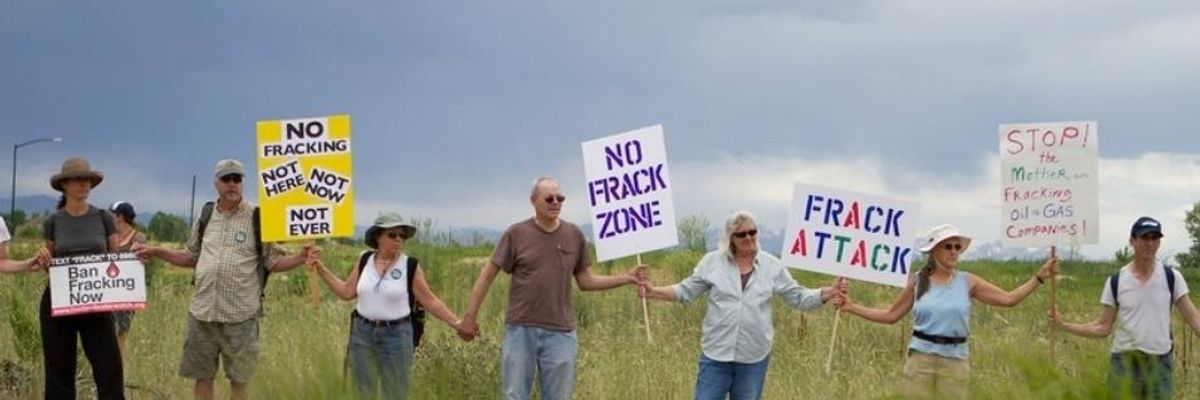
Activists in Erie, Colorado protest fracking in their community. (Photo: Erie Rising)
To donate by check, phone, or other method, see our More Ways to Give page.

Activists in Erie, Colorado protest fracking in their community. (Photo: Erie Rising)
The United States is expected to overtake Saudi Arabia as the number one liquid petroleum producing nation in the world for the first time in over two decades, thanks to America's fracking boom, Financial Times reported Monday.
According to journalists Ed Crooks and Anjli Raval, this could happen as soon as "this month or next."
The article cites information from the International Energy Agency, which shows that "US production of oil and related liquids such as ethane and propane was neck-and-neck with Saudi Arabia in June and again in August at about 11.5m barrels a day." The article argues, "With US production continuing to boom, its output is set to exceed Saudi Arabia's this month or next for the first time since 1991."
The explosion is largely due to a "shale revolution," explains the article, referring to the controversial practice of extracting oil from shale using a process of hydraulic fracturing, or fracking.
Organizations and communities across the U.S. have pushed for a ban on this extraction method, due to its role in destabilizing the climate, devastating residents near fracking sites who suffer cancer and disease from water and air pollution, marring natural landscapes, and killing wildlife.
Donald Trump’s attacks on democracy, justice, and a free press are escalating — putting everything we stand for at risk. We believe a better world is possible, but we can’t get there without your support. Common Dreams stands apart. We answer only to you — our readers, activists, and changemakers — not to billionaires or corporations. Our independence allows us to cover the vital stories that others won’t, spotlighting movements for peace, equality, and human rights. Right now, our work faces unprecedented challenges. Misinformation is spreading, journalists are under attack, and financial pressures are mounting. As a reader-supported, nonprofit newsroom, your support is crucial to keep this journalism alive. Whatever you can give — $10, $25, or $100 — helps us stay strong and responsive when the world needs us most. Together, we’ll continue to build the independent, courageous journalism our movement relies on. Thank you for being part of this community. |
The United States is expected to overtake Saudi Arabia as the number one liquid petroleum producing nation in the world for the first time in over two decades, thanks to America's fracking boom, Financial Times reported Monday.
According to journalists Ed Crooks and Anjli Raval, this could happen as soon as "this month or next."
The article cites information from the International Energy Agency, which shows that "US production of oil and related liquids such as ethane and propane was neck-and-neck with Saudi Arabia in June and again in August at about 11.5m barrels a day." The article argues, "With US production continuing to boom, its output is set to exceed Saudi Arabia's this month or next for the first time since 1991."
The explosion is largely due to a "shale revolution," explains the article, referring to the controversial practice of extracting oil from shale using a process of hydraulic fracturing, or fracking.
Organizations and communities across the U.S. have pushed for a ban on this extraction method, due to its role in destabilizing the climate, devastating residents near fracking sites who suffer cancer and disease from water and air pollution, marring natural landscapes, and killing wildlife.
The United States is expected to overtake Saudi Arabia as the number one liquid petroleum producing nation in the world for the first time in over two decades, thanks to America's fracking boom, Financial Times reported Monday.
According to journalists Ed Crooks and Anjli Raval, this could happen as soon as "this month or next."
The article cites information from the International Energy Agency, which shows that "US production of oil and related liquids such as ethane and propane was neck-and-neck with Saudi Arabia in June and again in August at about 11.5m barrels a day." The article argues, "With US production continuing to boom, its output is set to exceed Saudi Arabia's this month or next for the first time since 1991."
The explosion is largely due to a "shale revolution," explains the article, referring to the controversial practice of extracting oil from shale using a process of hydraulic fracturing, or fracking.
Organizations and communities across the U.S. have pushed for a ban on this extraction method, due to its role in destabilizing the climate, devastating residents near fracking sites who suffer cancer and disease from water and air pollution, marring natural landscapes, and killing wildlife.